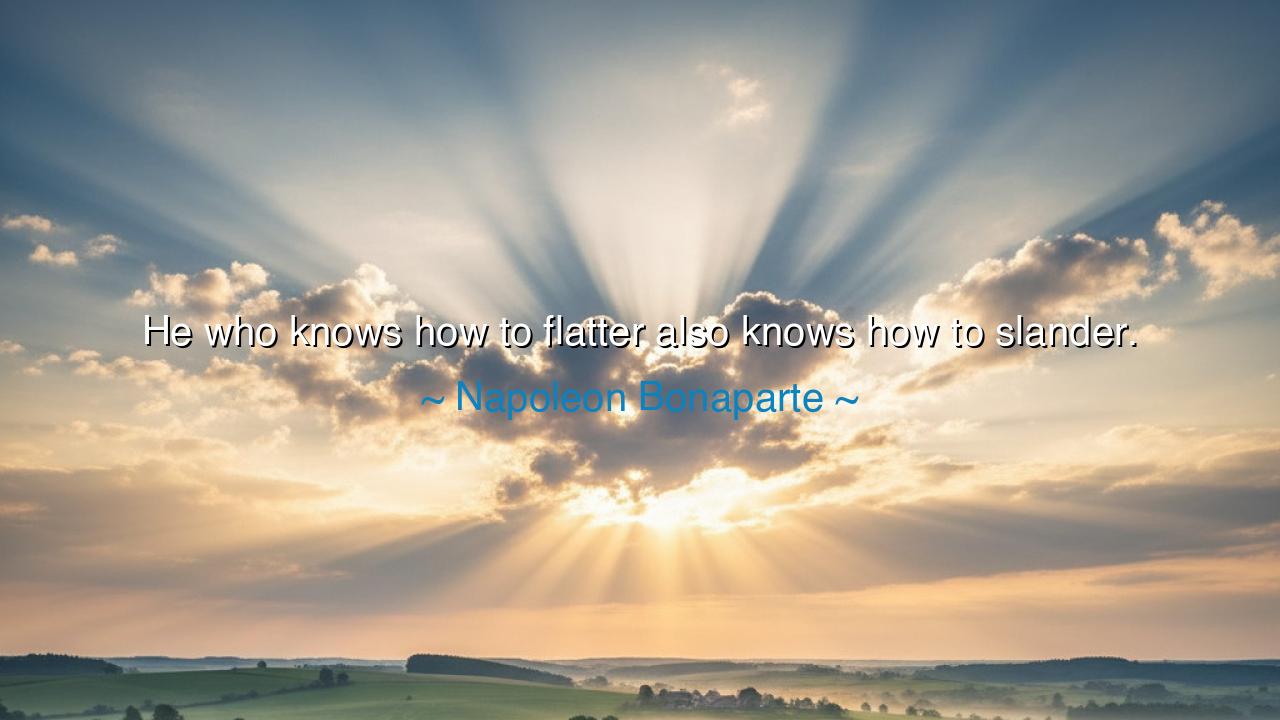
He who knows how to flatter also knows how to slander.






The words of Napoleon Bonaparte — “He who knows how to flatter also knows how to slander.” — pierce like a blade, sharp with the insight of one who walked among both loyalty and betrayal. Napoleon, who rose to imperial heights and fell into exile, understood the double-edged tongue of men. The same lips that speak honeyed praise in one hour can unleash venom in the next. Thus, his words are both warning and wisdom: beware those who wield their speech too skillfully, for their art conceals both devotion and destruction.
The meaning is clear and sobering. Flattery and slander are not opposites, but twins born of the same deceitful spirit. Both spring from a desire to manipulate rather than to honor truth. The flatterer praises not from love, but from self-interest; and when his interest shifts, his voice turns to slander, tearing down with the same passion it once used to build up. Napoleon’s words teach us to judge character not by the sweetness of its speech, but by the constancy of its deeds.
History offers many witnesses to this truth. Consider the fall of Julius Caesar, who was surrounded by senators offering loyalty and honor, only to be cut down by those same hands in the Ides of March. Their flattery had cloaked their ambition, their whispered praise disguising daggers. When the tide of power turned, their lips that once spoke adoration gave way to betrayal. Caesar’s fate embodies Napoleon’s warning: he who knows how to flatter knows also how to destroy.
Napoleon himself lived in the storm of such words. Courtiers, generals, and politicians lauded him as the savior of France, the genius of Europe, yet when his empire began to crumble, many turned on him with slander, eager to save themselves from his ruin. In this, his insight was forged not from philosophy alone, but from bitter experience. He learned that the flatterer is never a true friend, but a shadow that shifts with the light of fortune.
Let this wisdom endure: trust not in the sweetness of words, but in the steadfastness of character. For flattery is a mask, and beneath the mask often waits betrayal. The wise ruler, the wise friend, the wise soul must always remember: the same tongue that can raise you up with praise may, in the next moment, cast you down with slander. Thus Napoleon’s voice cries across the ages — guard your heart, and measure men not by their words, but by the truth of their loyalty.






XNXuan Nguyen
Napoleon’s quote challenges the idea that those who flatter are only interested in kindness or praise. It suggests that those who know how to manipulate positively can just as easily turn those skills to harm. How do we navigate this balance in our relationships? Should we be more cautious about who we trust, knowing that a flattering person might not always have our best interests at heart?
ADDao Anh Duong
This statement highlights the dual-edged nature of communication. When someone is skilled at flattery, they may also understand how to use words to harm others. But does that mean every flattering comment carries hidden malice? Or does it just reflect the complexity of human relationships, where kindness and manipulation often exist on the same spectrum?
KKhuyen
I find this quote quite intriguing. Flattery is often seen as a positive trait, yet Napoleon implies that it’s also a gateway to slander. Does this mean that people who are overly charming may not always have the best intentions? Could it also suggest that one’s ability to manipulate words—whether positively or negatively—is a sign of power in social dynamics?
LTNguyen Thi Ly Thi
Napoleon’s insight into the art of both flattery and slander makes me wonder about the balance of power in relationships. If you can flatter someone to get what you want, how easily can you turn those same words into a tool for criticism or sabotage? Is this why some people are so careful with their words, knowing that they can be used for both building up and tearing down?
MLDoan Thi My Le
This quote resonates with the idea that those who manipulate with words often have a dual agenda. It makes me question the authenticity of praise we receive from others—does someone who flatters also have the potential to use words as weapons when needed? Is this just a cynical view, or does it reflect real dynamics in power relationships?